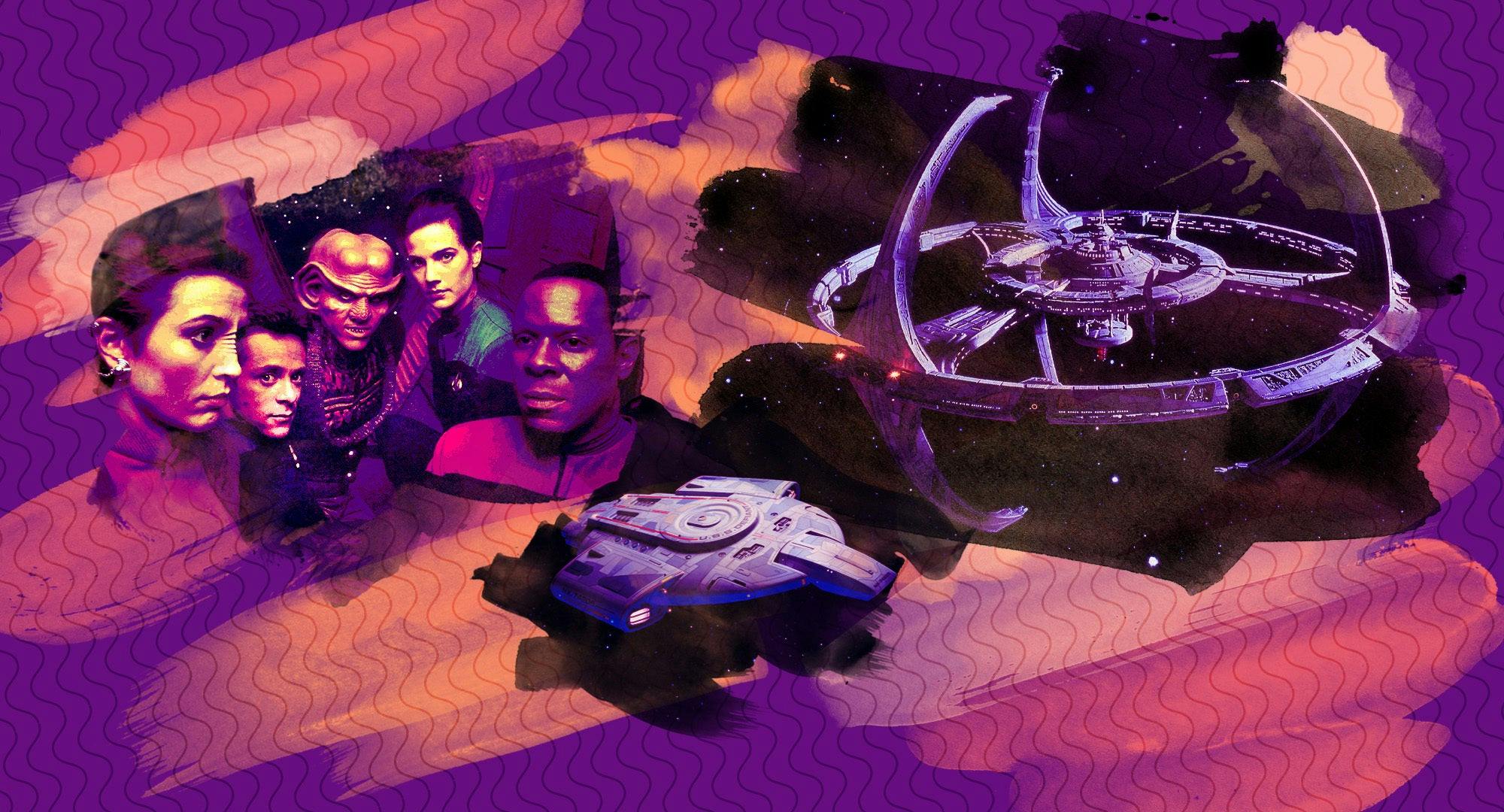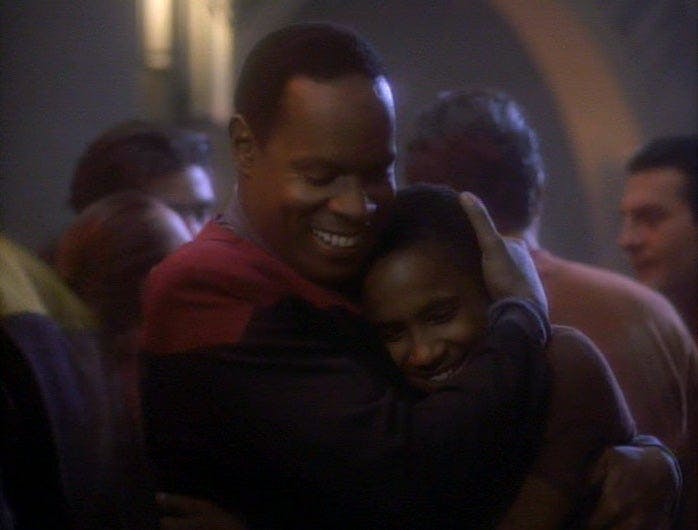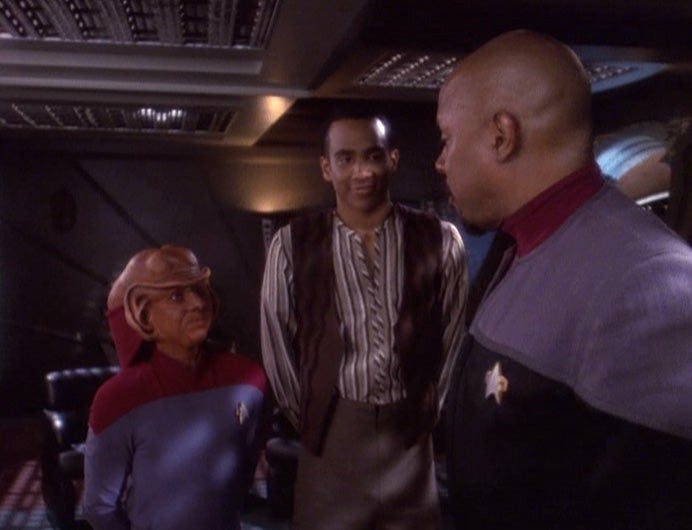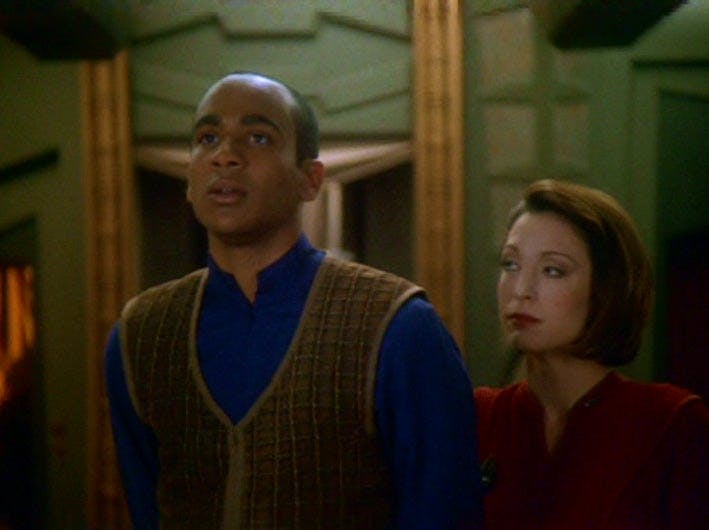Published Jan 6, 2023
There Can Be No Turning Back: How I Learned to Love Star Trek: Deep Space Nine
'Looking to the future, I am at once hopeful and terrified, and DS9 perfectly captures this paradox.'

StarTrek.com
My first contact with Star Trek: Deep Space Nine was in college, when a fellow Star Trek fan jokingly referred to the series as 'Deep Sleep Nine.' I laughed along; I had grown up watching Star Trek: The Original Series and Star Trek: The Next Generation movies with my dad, and the idea of an entire Star Trek franchise taking place on a space station seemed ludicrous. The whole point of Star Trek, to me, was the excitement of adventure and exploration, of meeting new species and new cultures. Staying still was of no interest to me.
When the pandemic first started, my fiancé and I coped by re-watching The Next Generation. It was mid-March and we thought we would be back to work by April. We found comfort in Captain Picard’s brilliance and erudition, in how his crew triumphed in dicey situations simply by working together. Part of me still believed we lived in an America that was relatively safe, and TNG’s innate optimism buoyed me.
Star Trek: Deep Space Nine — The Journey
March turned to April turned to May, and we were still stuck at home while the pandemic raged. People fell victim to the virus. Unemployment numbers began to climb. TNG ended and, too exhausted to find something new to watch, we pressed play on DS9. Before we started, I issued a warning to my fiancé based on the handful of episodes I saw years ago. "The show is gloomy," I told him. "No one goes anywhere."
But no one is (hopefully) going anywhere right now, and I fell in love with DS9 with its first episode. The promenade reminded me of my increasingly chaotic living space, and the Starfleet uniform mirrored the yoga pants I now lived in. Seeing the shots of the Deep Space 9 space station suspended in air, cut off from all its Starfleet allies, under threat from the Cardassians, and later the Dominion, I couldn’t help but feel like we’re all trapped on a space station right now with no end in sight.

StarTrek.com
The show’s constant sense of impending doom was a big draw. Watching Sisko go from hearing secondhand about the Dominion, to realizing it’s a real threat, to doing his best but still failing to hold onto his space station, felt like a real-time reflection of our nationwide response to the pandemic.
To me, the show’s real triumph is its depiction of everyday life in the face of overwhelming uncertainty. Even as the Dominion grew stronger and Starfleet became more unreliable, Sisko still parented. O’Brien still had marriage troubles. Crew members still went to Quark’s bar and developed romances and friendships. DS9 doesn’t shy away from the mundane, from birth to death and everything in between.

StarTrek.com
The show’s portrayal of self-care as revolutionary acts feels uncanny for our time. In one of my favorite episodes “In the Cards,” Jake and Nog cheered up the crew through small acts of kindness, all in an attempt to purchase a Willie Mays baseball card for Captain Sisko. In DS9 as in quarantine, a hobby is never just a hobby; it’s a coping mechanism. Sisko’s baseball games, along with Bashir and O’Brien’s Alamo reenactment, all mirror our own desperate gardening and sourdough bread-baking.
For a series so fixated on war, DS9 is revolutionary in its redefinition of winning. Rather than besting your enemy or advancing humanity, characters in DS9 often win by simply holding their ground. Sisko’s big idea for victory was taking back the space station in “Sacrifice of Angels,” and both he and Admiral Ross refused to celebrate with Martok when they defeated the Dominion. Captain Sisko doesn’t fight to win; he fights for what he believes in.

StarTrek.com
In this new reality instigated by the pandemic, my relationship with the future has changed. I no longer want to boldly go where no one has gone before; all I want is to stay put and stay alive. Looking to the future, I am at once hopeful and terrified, and DS9 perfectly captures this paradox in its series finale “What You Leave Behind.” Even as the war came to an end, there was the feeling that nothing will ever be the same. The people we love have gone away, the institutions we relied on have been proven untrustworthy. In the end, all we can do is stare at the wormhole like Jake Sisko, hoping for better things ahead and finding comfort in personal connections.
Admiral Ross famously quoted General MacArthur in the last episode of DS9, as the Dominion handed him the peace treaty. “Today, a great tragedy has ended,” he said. “We have known the bitterness of defeat and the exultation of triumph, and from both, we have learned there can be no turning back.” Against the backdrop of unprecedented unemployment numbers and surges in COVID-19 cases, watching this scene brought me to tears. Those words have never rung truer. The world we knew is never coming back, and we can only move forward, with the lessons and fortitude we were forced to acquire.
This article was originally published on November 11, 2020.
Livian Yeh (she/her) is a writer and translator living in San Francisco, CA. She is an avid baseball fan like Captain Sisko, and is making her way through Voyager.
Stay tuned to StarTrek.com for more details! And be sure to follow @StarTrek on Facebook, Twitter, and Instagram.

